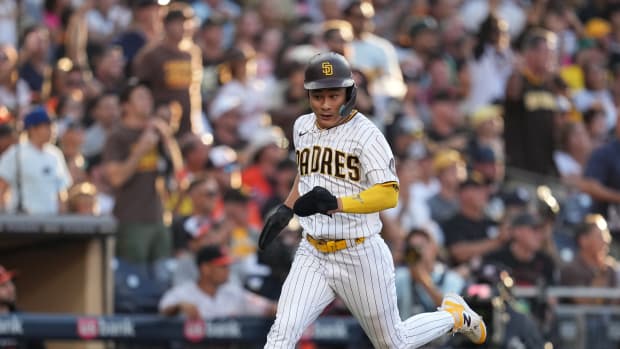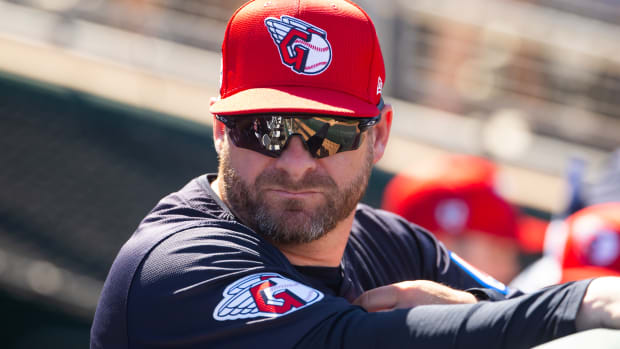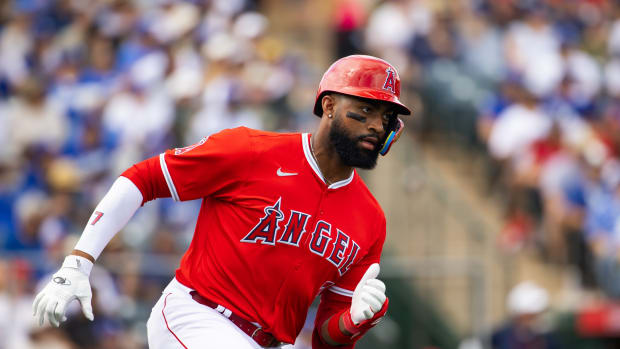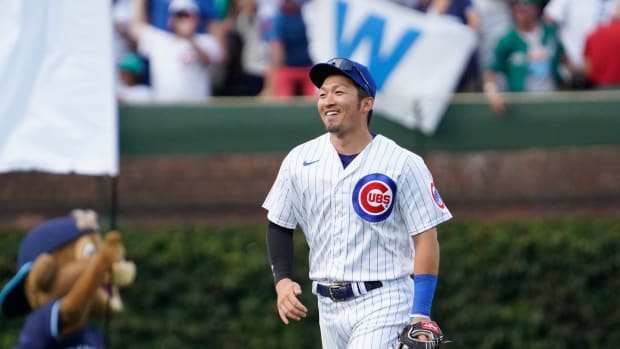The Best Possible Move for Every American League Team Before the Trade Deadline
The All-Star Game is over, and now the attention turns to this month’s other big baseball event: the July 31 trade deadline. Three weeks stand between now and the last chance for contenders to add help and for rebuilders to move stars for prospects. And while each side has many potential moves they could pull off, which is the one deal that makes the most sense for each? Here’s a quick look at the ideal trades for all 15 American League teams, whether they're getting ready for October or planning for 2020 and beyond. You can find our look at the best deal for each of the 15 AL teams here.
Baltimore Orioles (27–62, fifth place in AL East) — Trade 2B/SS Jonathan Villar
The Orioles don’t have much in the way of players to move, with Villar and Andrew Cashner the most likely to intrigue opposing GMs. The former would be the more desirable, as he’s both better and under team control longer than the latter. The Red Sox, Rangers, Cubs, Padres and Rockies all fit the bill of teams that could use help at the keystone.
Boston Red Sox (49–41, third place in AL East; 2 GB of second AL wild card) — Trade for Mets RHP Zack Wheeler
Boston’s bullpen is a tire fire, but Dave Dombrowski is apparently convinced that shifting Nate Eovaldi into relief solves that problem. Maybe it does, but it opens up an entirely new hole in the rotation, which is already thin and struggling. The Red Sox’ farm system isn’t good enough to afford anything but a rental, so if it’s a starter they want, someone like Wheeler is the best bet—and given their perilous position in the division and wild card, they can’t afford to settle for an average arm.
Chicago White Sox (42–44, third place in AL Central) — Trade RHP Alex Colome
Contenders always need relief help, and while Colome is no longer a dominant closer, he’s still a reliable late-inning option for those in need. The Rays, Red Sox, Twins, Braves, Nationals, Phillies, Brewers, Dodgers and Diamondbacks are likely all in the market for bullpen depth. Beyond Colome, Chicago—which is flirting with .500 but doesn’t have the hallmarks of a true contender—doesn’t have much else to offer.
Cleveland Indians (50–38, second place in AL Central; second AL wild card) — Trade for Tigers OF Nicholas Castellanos
Castellanos is a goner in Detroit, as he’ll be a free agent after the season, but he can still help the right team. Cleveland is the very definition of that team, as the Indians are getting little from the combo of Tyler Naquin and Jake Bauers in left and right. Castellanos is a mess with a glove, but he can still hit, and as a rental bat, his price should be within even Cleveland’s bargain basement preferences.
Detroit Tigers (28–57, fifth place in AL Central) — Trade RHP Shane Greene
One of the best relievers on the market, Greene is outperforming his peripherals—his strikeout, walk and home-run rate all peg him as closer to a 3.50 ERA than the 1.09 he’s currently at—but he's still plenty valuable even if he takes a step back. The Rays, Red Sox, Twins, Braves, Nationals, Phillies, Brewers, Dodgers and Diamondbacks could all use an arm of his caliber.
Houston Astros (57–33, first place in AL West) — Trade for Pirates RHP Chris Stratton
Stratton is as far from a big name as you can get, and he’s already on his second team of 2019. But after an awful start with the Angels, he’s been excellent in relief for Pittsburgh, allowing just six runs in 17 1/3 innings with two walks and 15 strikeouts. And his arsenal makes him a good fit for Houston: His curveball has an average spin rate of 3,094 rpm, which ranks fourth highest in the majors, and the Astros are all about pitchers who can make a breaking ball tumble.
Kansas City Royals (30–61, fourth place in AL Central) — Trade RHP Ian Kennedy
If Kansas City made Whit Merrifield available, the return would be solid. But assuming the Royals hang on to him, then Kennedy makes sense given his sudden and likely unsustainable emergence as a solid closer. Moving his salary will be tough, but with the Rays, Red Sox, Twins, Braves, Nationals, Phillies, Brewers, Dodgers and Diamondbacks all probably looking for relievers, it’s a seller’s market, especially if Kansas City eats some money. Other Royals who might find new homes are Homer Bailey, Jake Diekman and Billy Hamilton.
Los Angeles Angels (45–46, fourth place in AL West; 6.5 GB of second AL wild card) — Trade for Mariners C Omar Narvaez and RHP Mike Leake
With Jonathan Lucroy down, catcher suddenly becomes a big position of need for the Angels. The rotation is also a problem, made all the worse by the death of Tyler Skaggs. Luckily for Los Angeles, the solution to both is in the division: a swap with Seattle that brings in Narvaez and Leake. The former has been one of the best-hitting backstops in the game this year, slashing .294/.366/.486. The latter has been … well, not one of the best pitchers in the game, but his 4.32 ERA and 101 ERA+ would make him practically the ace of the Angels’ staff, and he can eat innings with the best of them.
Minnesota Twins (56–33, first place in AL Central) — Trade for Rockies LHP Jake McGee
Minnesota’s bullpen has quietly been excellent despite its no-name cast of Taylor Rogers, Blake Parker, Trevor May, Ryne Harper and Tyler Duffey. Rogers is the lone lefty in that group, though, and he’s more or less taken over the closer role. The best southpaw reliever on the market is the Giants’ Will Smith, but he might be too rich for Minnesota’s liking. A cheaper and equally good option against lefties is McGee, making a deep bullpen that much better. (If Colorado’s not selling, other possible targets that won’t bust the budget include the Mets’ Justin Wilson, the Giants’ Derek Holland or the Royals’ Jake Diekman.)
New York Yankees (57–31, first place in AL East) — Trade for Blue Jays RHP Marcus Stroman
A team on pace to win 105 games and with a massive lead in its division rarely needs much at the deadline, but the Yankees could stand to add help to a rotation that’s been mostly disappointing and often hurt. The easy link is Madison Bumgarner, but Brian Cashman has usually resisted the lure of the rental starter. Instead, Stroman fits well here, thanks to the year of team control he still has left on his contract. (Keep an eye on Cleveland, though; if the Indians become sellers, then Trevor Bauer becomes an intriguing possibility for New York.)
Oakland Athletics (50–41, second place in AL West; 1.5 GB of second AL wild card) — Trade for Marlins RHP Sergio Romo
Oakland’s needs are varied: The rotation is thin, the bullpen has taken a step back from 2018 and Stephen Piscotty has been a black hole in rightfield. But with Sean Manaea and possibly A.J. Puk on the way back from injury, the A’s can survive with their current starters. And while Piscotty has struggled (and is currently on the injured list), Mark Canha has thrived in his place. So the focus is on adding relief help. Romo has had a mediocre year in Miami, but he can still lock down righthanders (.238/.304/.393 against them this year) with his Frisbee slider. He won’t break the bank, either—always an important consideration with Oakland.
Seattle Mariners (39–55, fifth place in AL West) — Trade RHP Mike Leake
Leake is the definition of average, but average would go a long way for a number of teams with rotation holes, including the Yankees, Twins, Red Sox, Angels, Braves, Phillies and Brewers. Seattle may also look to deal Dee Gordon, Omar Narvaez and Kyle Seager in an effort to continue shedding salary.
Tampa Bay Rays (52–39, second place in AL East; first AL wild card) — Trade for Mets RHP Seth Lugo
Assuming the Rays can get by with some combination of Ji-man Choi and Nate Lowe at first base, their biggest need is in the bullpen, which has lost Jose Alvarado and Diego Castillo for the foreseeable future. The ideal would be a reliever who can get multiple outs, as Tampa loves its bullpen flexibility. A former starter, Lugo is adept at going more than an inning at a time; 14 of his 33 outings this year have been three outs or more. Plus, with his high-spin curveball, he’s a match made in heaven for the data-savvy Rays—and since he’s under team control for a few more years, he’s cheap, too, which is even more their style.
Texas Rangers (48–42, third place in AL West; 3 GB of second AL wild card) — Trade for Blue Jays 1B Justin Smoak
The Rangers’ offense is wildly uneven, carried mostly by Joey Gallo, Hunter Pence and Shin-soo Choo. Conversely, Texas is getting close to nothing from Jeff Mathis behind the plate, Ronald Guzman at first base, Rougned Odor at second and Asdrubal Cabrera at third. The easiest of those to upgrade is first base, and Smoak—a former Rangers top prospect—is just the man to do it. At 32 and a free agent this winter, he has no place in Toronto’s rebuild. And although he’s hitting just .217, his metrics paint a brighter picture: a .262 expected batting average and .520 expected slugging percentage, thanks to a hard-hit rate of 39.4% and average exit velocity of 90.1 mph.
Toronto Blue Jays (34–57, fourth place in AL East) — Trade RHP Marcus Stroman
Ken Giles will bring back a nice haul as arguably the best reliever on the market, but Stroman should get even more in return as a young cost-controlled starter with ace upside. That would make it hard for the rebuilding Jays to pass on moving him, particularly if there are a lot of bidders—and between the Yankees, Twins, Red Sox, Angels, Braves, Phillies and Brewers, there are lots of contenders who need pitching help.


































